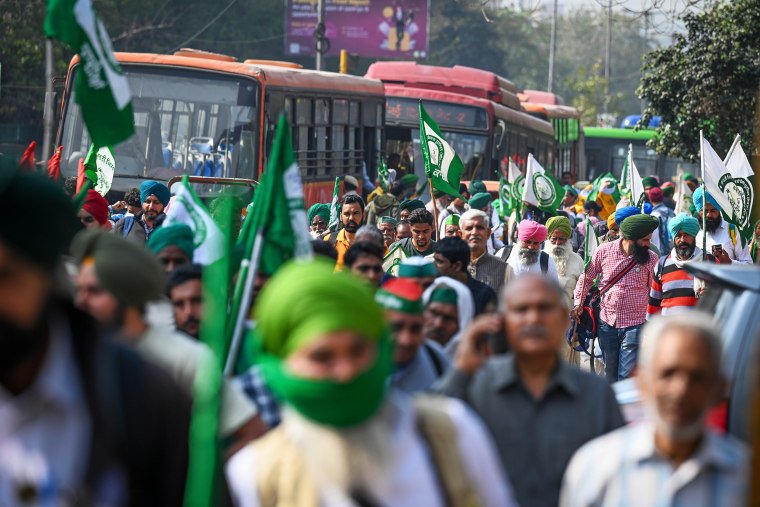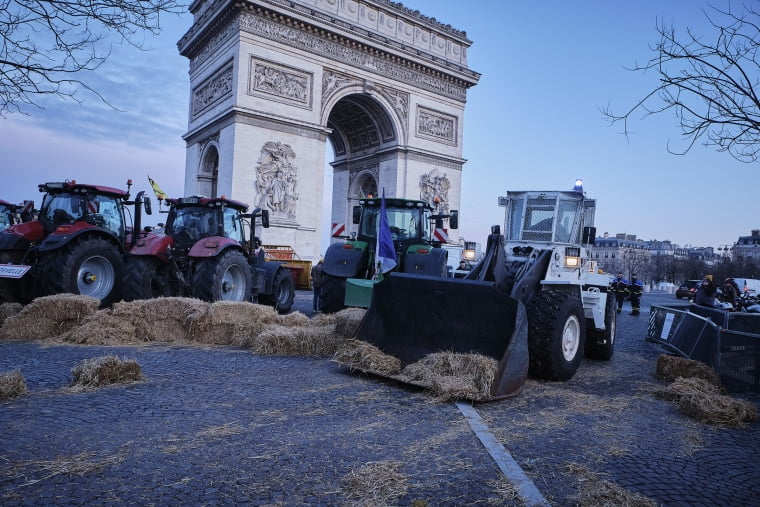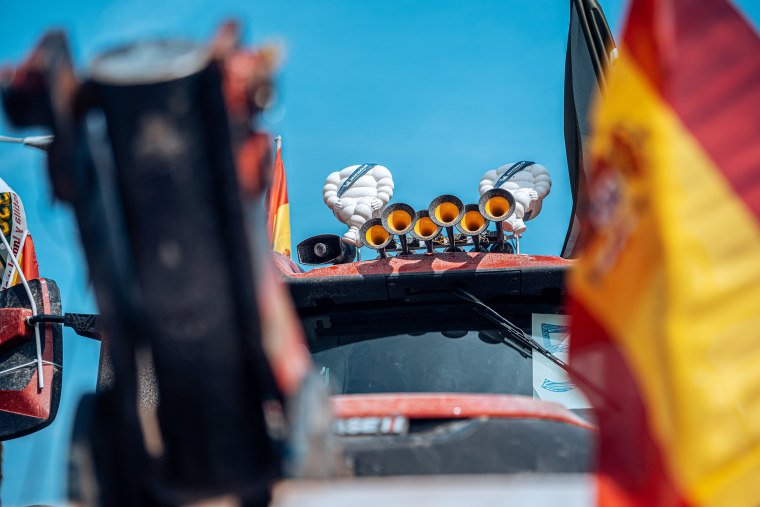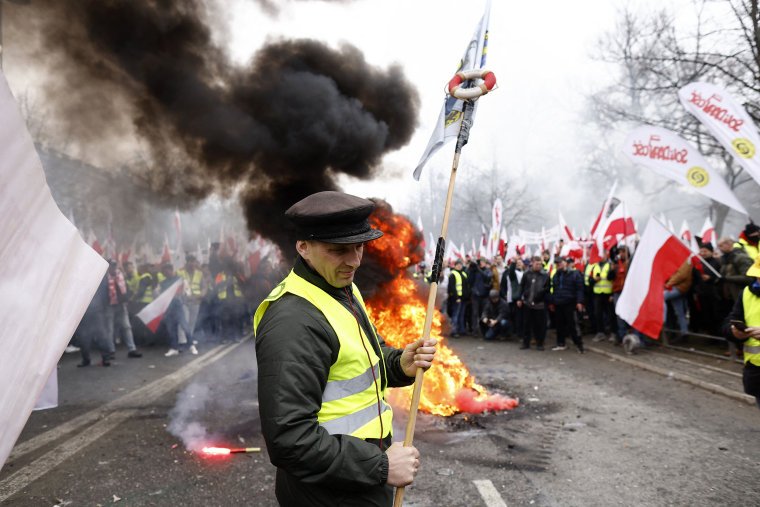Farmers are protesting, among other things, the effects of Russia’s war in Ukraine, increased competition, and the slowing of climate change in Europe and India.
In Short
- Farmers in europe and india protest against various issues affecting agriculture.
- Russia’s war in ukraine and climate change add complexity to these challenges.
TFD – Dive into the pressing issues of farmers protests, Russia’s war impact, and climate change challenges, urging governments to find viable solutions for sustainable agriculture.

Karan Singh spent weeks living in an improvised tent 180 miles away from New Delhi, the capital of India.
When Singh and five other farmers from his village in the western state of Punjab drove down in a tractor to join thousands more in an increasing campaign to pressure the government to raise crop prices, they were living off their own supplies, which included a gas cylinder and raw produce they packed from their farms.
Singh, who primarily harvests wheat and rice on his 10-acre parcel of land, declared, “I am drowning in debt.” “We are making every effort to use our farms. Production is not lacking, but we are unable to sell it for a reasonable price.
Not only have tractors been tearing up highways in India, but also throughout Europe. There, farmers have taken to the streets of Paris, Brussels, and other cities in a rage about problems like as the effects of Russia’s war in Ukraine, climate change, and measures to combat it.

Although the particular causes of the ire differ from nation to nation, the end effect is generally the same: farmers claim that governments must act decisively to preserve their way of life. Experts assert that the timing is not coincidental, as demonstrators are vying for pro-policy measures during a year marked by a record number of global elections.
The majority of farmers don’t turn a profit. According to Chris Hegadorn, a former US ambassador and adjunct food politics professor at Sciences Po in Paris, “the majority of them are barely making ends meet and doing arduous labor that most city people don’t understand.”
“They can make their case in public during election cycles,” Hegadorn stated.
Earlier this year, Singh and thousands of farmers from northern India started marching to the capital, calling for debt relief measures in addition to increased prices for their crops. They were met with tear gas, rubber bullets, internet blackouts and police batons and blocked from the capital for weeks until last Thursday, when they were allowed to rally there.
A fight between the farmers and the ruling Bharatiya Janata Party (BJP), led by Prime Minister Narendra Modi, is being avoided in anticipation of later this year’s elections.
As an associate professor at American University in Washington, D.C., Garrett Graddy-Lovelace stated, “I think the power of farmers is frightening Modi and the BJP government.”
She went on, “They are a powerful political force.”
Farmers claim that instead of requesting subsidies, they are only seeking a reasonable price that would allow them to make a 50% profit above their cost of production.
Graddy-Lovelace stated that “the urgency of staying on the land depends upon a fair price so they can stay on their land and keep nourishing the people.”
Approximately 66% of India’s 1.4 billion inhabitants work as farmers.
They were dependent on a minimum support price—a price at which the government promises to purchase excess crop at the conclusion of the harvest—for their harvests for many years. Historically, state governments have only purchased wheat and rice at set prices.
However, the government let corporate purchasers, who deal directly with the farmers, into the marketplaces in 2020.
Graddy-Lovelace commented, “On paper, it looked good.” However, “the farmers knew that the buyers would drive the price down to nothing if they were dealing directly with the buyer.”
The government was ultimately compelled to revoke the new farm regulations after months of protests and deadly altercations with officials in New Delhi. This was perceived as one of Modi’s biggest electoral setbacks since he assumed office in 2014.
Graddy-Lovelace called it a “extraordinary victory” that “pushes back against a whole kind of global paradigm that free trade works for farmers,” in addition to being a win for India.
However, the farmers claim that since the government has not fulfilled its pledges following that altercation, Singh and others have had to go far from home in an attempt to obtain improvements.
“Concerns among farmers are valid”
The struggles faced by farmers are not limited to India.
Across the European Union, farmers say they are battling soaring costs of living and production, rising taxes and the burden of new environmental rules, which they say renders them uncompetitive against cheaper imports from abroad.
Governments have made a “huge number of political commitments… to reduce greenhouse gases,” according to Hegadorn.
Farmers over the Continent have come together in protest over the past few months. Farmers have attempted to place their demand for reforms at the forefront of the June European Union parliamentary elections by honking their horns and, in some cases, dumping manure at government buildings in France, Germany, Belgium, the Netherlands, Poland, Spain, Italy, and Greece.

They claim that one significant problem is the onerous red tape associated with the numerous laws that are necessary in order to receive the subsidies that farmers throughout Europe rely on.
It has a lot of bureaucracy. Arnold Puech, the president of the World Farmers Organization and a farmer of cattle and poultry in the Normandy region of northern France, stated, “You have to pay an accountant and a lawyer to counsel you. According to him, even the smallest mistake in documentation or during agricultural inspections can result in a sizable consequence.
“My spouse dedicates her entire day to working on these administrative duties in front of the computer,” he stated.
In addition, protestors argue that the EU’s Green Deal, which aims to combat climate change, is too expensive and should be abandoned. Farmers in the two largest agricultural producing nations in Europe, Germany and France, are incensed over the increase in diesel prices resulting from the elimination of subsidies and tax benefits.
Politicians throughout the Continent have pledged to reduce rules and lessen the burden on farmers in response to the demonstrations. However, there has also been resistance to the farmers’ efforts to change Europe’s strategy.
Despite making up only 1.4% of the European Union’s GDP in 2022, the agriculture sector in Europe is mostly responsible for the continent’s greenhouse gas emissions. This is why environmentalists argue that stricter restrictions are needed to combat climate change.
The head of the Institute for European Environmental Policy’s land use and climate program, Julia Bognar, stated that “farmers’ concerns are real.”
“Yet, a long-term plan is required for the agriculture sector to shift toward more environmentally friendly methods,” the speaker stated.
According to Bognar, farmers’ former bargaining strength has diminished, forcing them to take actions that eventually have “negative environmental impacts.”
“In order to provide positive incentives toward mitigation actions, funding must be sufficient and stable,” she continued.
There are fears that the farmers’ protests are being seized on by far-right parties — which are expected to surge in those Europe-wide elections this summer — and by the Kremlin, too.
Ukraine, known as the breadbasket of Europe, has historically relied on its own agriculture industry. The EU has released Ukraine from import charges as part of its attempts to assist Kyiv during Russia’s conflict, which has resulted in an influx of agricultural goods onto the Continent that are not subject to the EU’s expensive environmental regulations.
This has enraged farmers, who now face competition from both local rivals and inexpensive imports from Ukraine in addition to local competitors.

This month, thousands of farmers and supporters marched through Warsaw, asking that Poland close its border with Ukraine in order to stop imports. In front of parliament, they set out smoke bombs in the national flag’s white and red hues, blew horns, and hurled stones at law enforcement, wounding multiple officers.
The Polish government chose to place the blame for the violence on unidentified “provocateurs and troublemakers” rather than “real farmers,” whose concerns it has promised to resolve.
There have been some protests in Poland with banners supporting Russian President Vladimir Putin and criticizing Ukraine, which has caused anxiety in Warsaw and others that Moscow is trying to use historical grievances to inflame hostility to European support for Ukraine.
Tensions between the governments of Kyiv and Warsaw, which has been a strong supporter of Ukraine, have increased as a result of the protests.
A decision to impose further restrictions on the entry of Ukrainian farm products was agreed by the EU on Wednesday.
However, it appears that the fundamental problems are not going to go away anytime soon, and governments across the world—from Europe to India—will need to find solutions to those alarming problems.
Conclusion
The ongoing farmers’ protests, coupled with the impact of Russia’s war in Ukraine and climate change, underscore the urgent need for governments worldwide to address and find lasting solutions to these critical issues affecting agriculture and livelihoods.
Connect with us for the Latest, Current, and Breaking News news updates and videos from thefoxdaily.com. The most recent news in the United States, around the world , in business, opinion, technology, politics, and sports, follow Thefoxdaily on X, Facebook, and Instagram .
